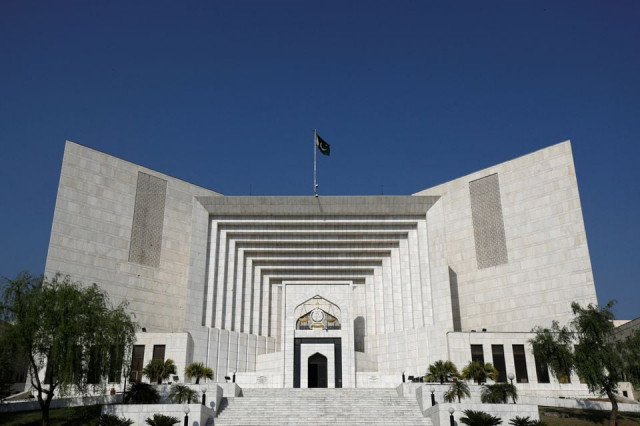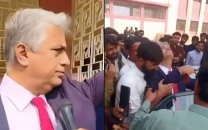Dissenting judges urge SC to revisit CJP's ‘one-man show’
Justices Shah and Mandokhail issue order stating that Punjab polls suo motu was dismissed 4-3

Two judges of the Supreme Court – Justice Syed Mansoor Ali Shah and Justice Jamal Khan Mandokhail – issued a 27-page order on Monday, stating that the suo motu case regarding the Punjab and K-P elections date announcement was dismissed by a majority of four judges out of seven.
The two judges aimed to “revisit the power of the one-man show enjoyed by the office of the Chief Justice of Pakistan” in order to “strengthen” the institution and “ensure public trust and confidence” in the apex court.
The order stated that the court could not be dependent on the solitary decision of one man but should be “regulated through a rule-based system approved by all judges of the court under Article 191 of the Constitution”.
“In regulating the exercise of its jurisdiction under Article 184(3) including the exercise of suo motu jurisdiction; the constitution of benches to hear such cases; the constitution of Regular Benches to hear all the other cases instituted in this Court; and the constitution of Special Benches,” it stated.
They maintained that the “power of doing a “one-man show” is not only anachronistic, outdated and obsolete but also is antithetical to good governance and incompatible to modern democratic norms”.
Read SC issues notices to respondents in Punjab polls delay case
“One-man show leads to the concentration of power in the hands of one individual, making the system more susceptible to the abuse of power. In contrast, a collegial system with checks and balances helps prevent the abuse and mistakes in the exercise of power and promotes transparency and accountability... We must not forget that our institution draws its strength from public perception”.
It continued that the CJP was conferred with “wide discretion in the matter of constituting Benches and assigning cases to them under the present Supreme Court Rules 1980” and the “unbridled power enjoyed by the Chief Justice” had “brought severe criticism and lowered the honour and prestige of this Court”.
The judges advised that “in order to build a strong, open and transparent institution, we have to move towards a rule-based institution”.
They added that where “the matter of constituting a bench for hearing a case under Article 184(3) of the Constitution is concerned, there must also be uniformity and transparency, which can be best assured by constituting a regular five or seven-member bench once at the commencement of every judicial year, or twice a year for each term of six months, by including in that bench the senior most Judges or the senior-most Judges of each Province on the strength of this court with the Chief Justice or the Senior Puisne Judge as head of that bench”.
According to the order, the constituting of special benches on case to case basis, after the institution of the cases, “is complete negation of fairness, transparency and impartiality required of a judicial institution to maintain its legitimacy and credibility of its judgments”.
The judges stated that “the suo motu proceedings, in the facts and circumstances of the case, are wholly unjustified in the mode and manner they were taken up under Article 184(3) of the Constitution, besides being initiated with undue haste”.
Read All eyes on CJP after ECP volte-face
They furthered that the matter did not constitute a fit case to exercise extraordinary original jurisdiction of the apex court under Article 184(3) and was this “not maintainable” as the “same constitutional and legal issues seeking the same relief are pending and being deliberated upon by the respective Provincial High Courts in Lahore and Peshawar”.
The order maintained that there was “no justification to invoke” the court’s extraordinary jurisdiction to initiate suo motu proceedings, as a single bench of the Lahore High Court “has already decided the matter in favour of the petitioner before the said High Court”.
It added that the intra-court appeals filed against the said judgment were pending before the division bench of the LHC and none of the petitioners had approached the apex court.
“Once a constitutional issue is pending before a Provincial High Court, keeping in view the Federal structure of our Constitution the autonomy and independence of the apex provincial constitutional court, should not be readily interfered with but rather be supported to strengthen the provincial autonomy and avoid undermining the autonomy of the provincial constitutional courts”.
The order concluded that even otherwise “without prejudice to the above”, such matters “should best be resolved by the Parliament”.
Justices Shah and Mandokhail highlighted that they were in agreement with the decisions of Justice Yahya Afridi and Justice Athar Minallah when they questioned the intent of the suo motu and urged the constitution of a full bench.
The judges dismissed the present constitution petitions and dropped the suo motu proceedings.



















COMMENTS
Comments are moderated and generally will be posted if they are on-topic and not abusive.
For more information, please see our Comments FAQ